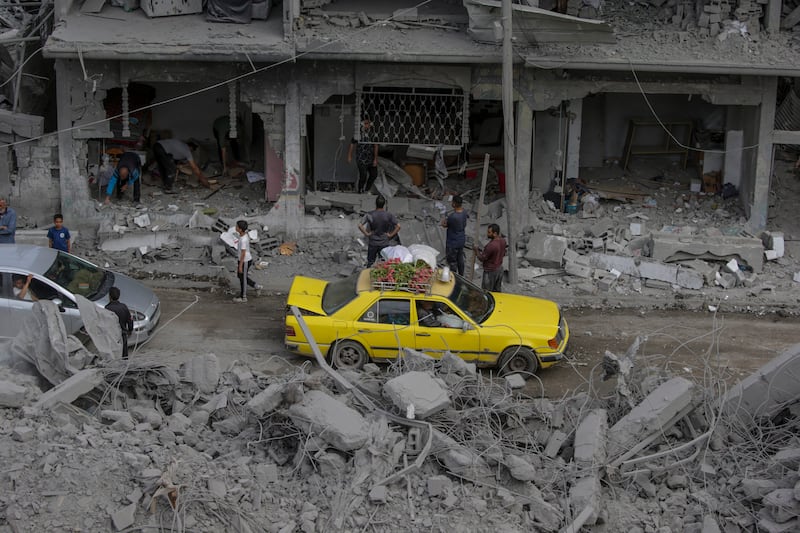Live updates: Follow the latest on Israel-Gaza
A Hamas delegation will arrive in Egypt on Monday to deliver its response to truce proposals that include an initial three-week pause in fighting that would see the release of 20 hostages held by the groupsince Israel's war in Gaza began more than six months ago, The National has learnt.
Sources familiar with continuing contacts over the proposals told The National that the three-man Hamas delegation will be led by Khalil Al Haya, deputy and confidante of the group's Gaza leader, Yahya Sinwar.
The delegation will be meeting top officials from Egypt's intelligence agency, they said.
The proposed 21-day pause was designed to build trust between Hamas and Israel and, barring unforeseen developments, would be followed by a 10-week ceasefire, according to the sources.
During the longer truce, they explained, Israel and Hamas would enact a larger prisoner and hostage swap and allow the return home to central and northern Gaza of at least 300,000 displaced Palestinians who have taken refuge in the southern part of the enclave.
The displaced people would undergo security screening by Israel before they are allowed back, said the sources.
The 20 captives Hamas would release during the three-week truce, according to the proposals, would be made up of women, minors and ailing hostages, as well as five female Israeli soldiers Hamas is thought to be holding, said the sources.
They would be released in exchange for a yet-to-be-specified number of Palestinians held in Israeli prisons.
Hamas is thought to be holding a total of 130 hostages, of whom about 30 are believed to have died in captivity, mostly in Israeli bombardment or from the lack of life-saving medications.
Previous proposals to end the war included a six-week ceasefire and the initial release of 40 hostages, but the sources said Hamas has made it clear in recent contacts with mediators from Qatar and Egypt that a shorter truce means it would release half that number in the first stage of the deal.

On Saturday, Hamas said it was reviewing the new proposals as Egypt, which borders both Israel and Gaza, appears to have stepped up efforts to broker a deal to stave off a ground Israeli offensive into the southern Gaza city of Rafah on the Egyptian border.
More than one million Palestinians are known to have taken refuge in Rafah, many of whom are living in makeshift tent camps. Some of the tents are in full view of the border fence separating the Egyptian and Palestinian halves of the city.
Egypt fears that a ground Israeli offensive on Rafah will leave the displaced there with no choice but to storm the border to find safety in its vast and sparsely populated Sinai Peninsula, something it says would undermine its national security.
Hamas has been insisting it would not accept a deal to end the fighting unless it provided for a permanent ceasefire, a full Israeli withdrawal from Gaza, unconditional return of the displaced to their homes and free and sufficient flow of humanitarian aid into the coastal enclave.
Israel has dismissed these conditions as delusional and says it will continue fighting until it frees the remaining 130 hostages Hamas continues to hold and annihilates the militant group that has ruled Gaza since 2007.

The sources said the new proposals are unlikely to meet the approval of Hamas, but they could provide the basis for a revival of negotiations to end the war that stalled earlier in April, with both Israel and Hamas accusing the other of not being serious about reaching a deal.
A high-level Egyptian delegation wrapped up a visit to Israel on Friday when it discussed a “new vision” for a prolonged ceasefire in Gaza, according to an Egyptian official quoted by the Associated Press.
The mediators are working on a compromise that will answer most of both parties’ main demands, which could pave the way to continued negotiations with the goal of a larger deal to end the war, the official told the AP.
The Egyptian delegation's talks in Israel followed a visit to Cairo on Wednesday by an Israeli delegation from Israel's spy agency Mossad and its domestic counterpart, Shin Bet, according to the sources.
They said Israel remained steadfast in its position not to fully withdraw from Gaza, insisting it must maintain buffer zones in areas abutting Israel in Gaza's northern and eastern flanks. It's also adamant not to allow fighting-age men from returning home to northern and central Gaza.
Israel is also balking at the number and identity of Palestinian prisoners that Hamas wants freed in exchange for the hostages, said the sources. It is also rejecting a Hamas demand to move its forces away from Gaza's two main highways to areas bordering Israel during the initial ceasefire.
The news website Axios, meanwhile, reported that Israel has indicated to mediators a willingness to discuss the "restoration of sustainable calm" in Gaza after all the hostages are released.
It is the first time since the war began that Israeli leaders have suggested they are open to discussing an end to the war, said Axios, whose report quoted two Israeli officials.
As the war drags on and casualties mount, there has been growing international pressure for Hamas and Israel to reach a ceasefire and avert a possible Israeli attack on Rafah, where more than half of Gaza's 2.3 million people have sought refuge after fleeing fighting elsewhere in the territory.
Hamas sparked the Gaza war with an attack on southern Israel on October 7 that killed around 1,200 people, mostly civilians. Hamas also took some 250 people as hostages, of whom about a 100 were released during a week-long truce in late November.
Mediators from Egypt, Qatar and the United States have since then been trying, without success, to broker a ceasefire.
Hamas’s October attack has drawn a devastating response from Israel, which launched a relentless air and ground campaign that has to date killed more than 34,000 Palestinians and injured twice as many. It has also displaced most of the enclave’s 2.3 million residents and razed large swathes of built-up areas throughout the coastal territory.






